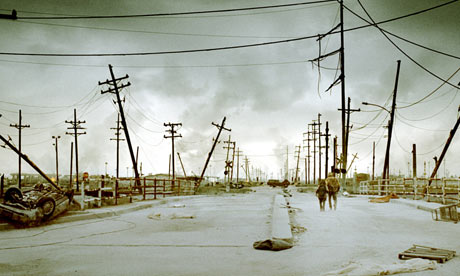
Moira Young's Blood Red Road, which has just won the Costa children's book award, is a dark dystopian teen survival tale told in first person narrative, which has already been snapped up by Ridley Scott's production company.
2011 was the year of the YA dystopian novel. The range of disasters on offer was impressive – from Julie Bertagna's flooded worlds to Charlie Higson's zombies to the futuristic earthquakes of Jeyn Roberts – this was not a time to chillax between the covers. Over the course of the year, sales of teen paranormal romance novels that had so dominated the market following Stephenie Meyer's Twilight series basically fell off a cliff as Dystopia dragged itself, on its one functioning claw, into town.
But why now? Conventional wisdom holds that when real life gets too dark, audiences tend to flock towards diversion, fluff and ostentatious glamour, as Americans did during the Depression era. But young adult readers are doing exactly the opposite. It seems they are finally waking from their 20-year apathetic slump (trust teens to sleep even longer than Snow White) and, kissed into action by colossal levels of future debt, a broken economic system and a looming climate crisis that threatens to wipe them out before they've even paid back their tuition fees, are waking up with one hell of a growl.
And why dystopia? Well, from Orwell's 1984 onwards, it has offered a powerful lens for examining contemporary society – and the best examples of the genre really push their readers into a fundamental re-evaluation of their lives. That's where the excitement in writing lies for me: in getting people to grapple with the big stuff. I love real – and dystopian fiction is ultimately a method of heightening the real to get to the truth.
And the truth needs all the help it can get. Modern politics doesn't fire the heart, climate change deadens the blood and global justice is a total flatliner. It's the Undead. Actually no, that makes it sound too interesting. It's the hamster you begged for when you were 12, promised to feed and water and exercise every day and then forgot about entirely, leaving it to die a slow lingering death in a pile of bitter cabbage leaves and dirty straw.
But not on Dystopia's watch! it's amazing to see an international array of world authors, armed only with a bit of sexy science and a couple of near-future scenarios, taking on the big issues of today and weaving them into gripping tales that young adults love to read.
So Moira Young, I salute you! Long may intelligent dystopian novels stay at the top of the pile, because we're going to need some sharp brains for what's up ahead. Teenagers are fabulous. What a piece of work is a teen, in action how like a vampire slayer, in apprehension how like Paris Hilton. The beauty of the world in Nikes, the paragon of the disposable income. And they do care. A lot. And they are the future. But they need new stories to fire them up. And they need them now.

